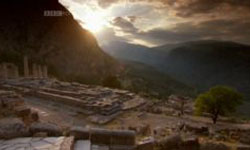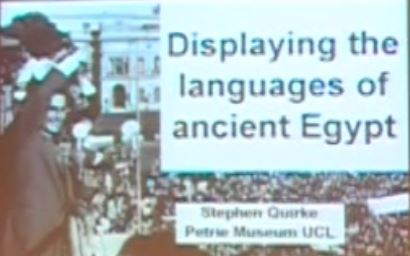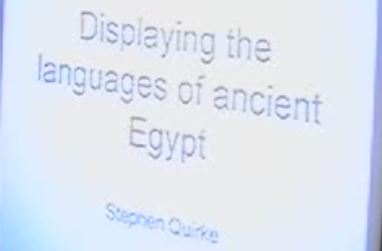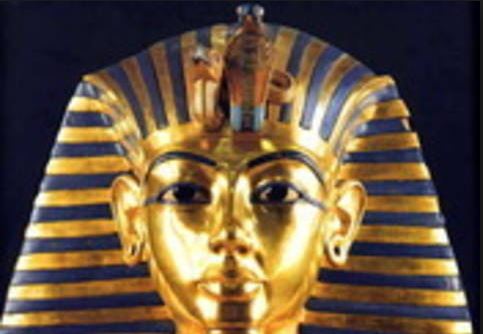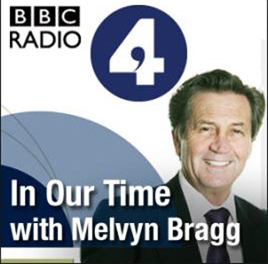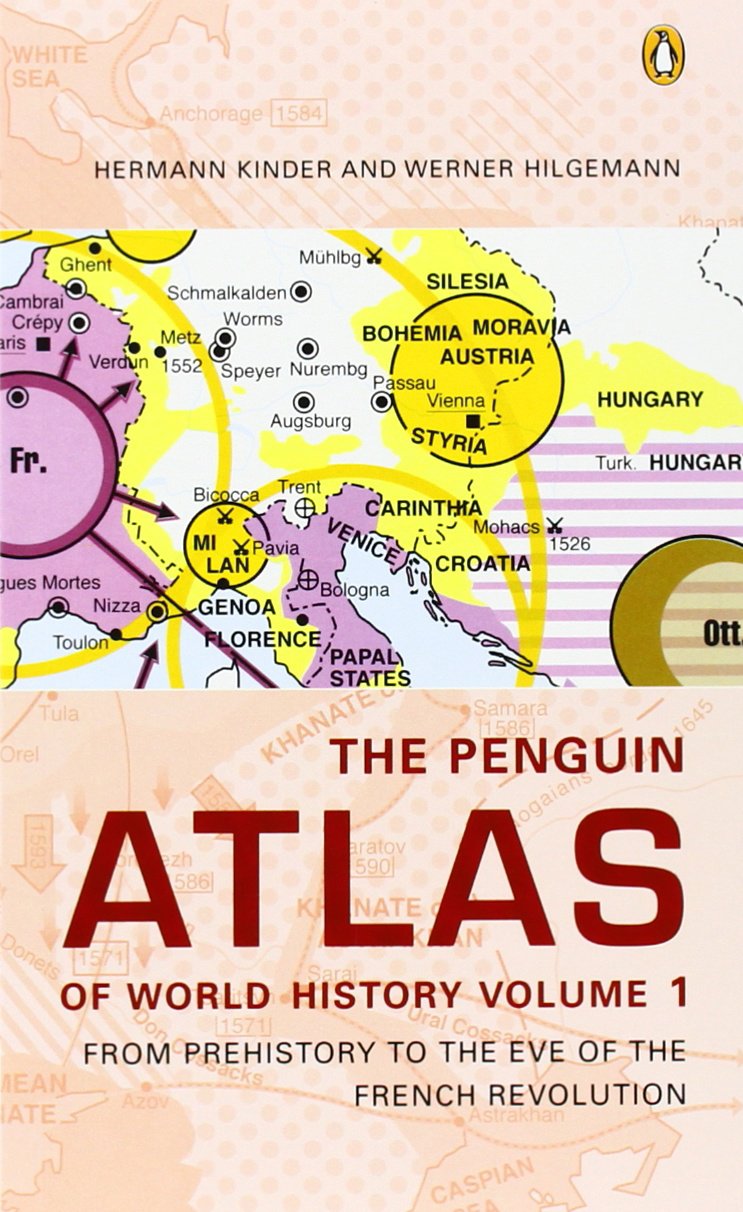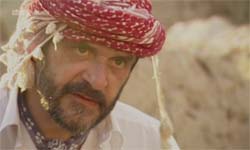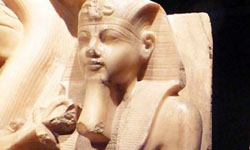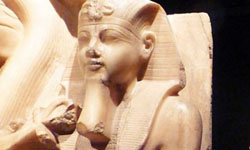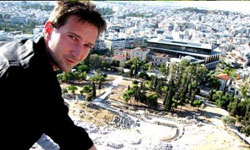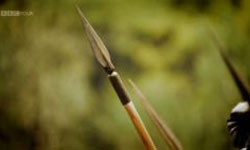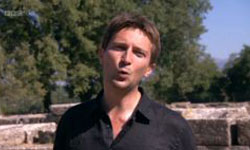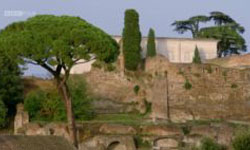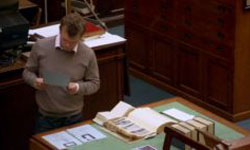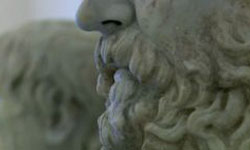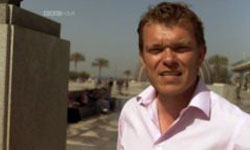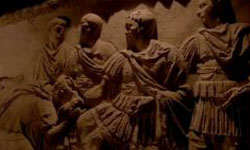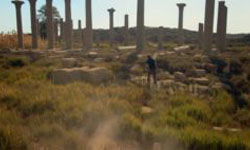Select one or more of these popular tags:
Eminent classical historian Robin Lane Fox embarks on a journey in search of the origins of the Greek myths. He firmly believes that these fantastical stories lie at the root of western culture, and yet little is known about where the myths of the Greek gods came from, and how they grew.
- British-Sign-Language
- Classical Civilisation
- BSL subtitles
- 90
Eminent classical historian Robin Lane Fox embarks on a journey in search of the origins of the Greek myths. He firmly believes that these fantastical stories lie at the root of western culture, and yet little is known about where the myths of the Greek gods came from, and how they grew.
-
Archaeology of Roman London
-
Dr Gustav Milne , 2011
Pre-sessional Lecture 2011
- Lectures
- Classical Civilisation
- No subtitles
- 55
Pre-sessional Lecture 2011
-
Cleopatra: Interpreting Evidence from the Classical World
-
Prof Maria Wyke
UPCH 2009-2010
- Lectures
- Classical Civilisation
- No subtitles
- 50
UPCH 2009-2010
-
Displaying the Languages of Ancient Egypt
-
Dr Stephen G. J. Quirke
Diploma 2008 / 2009
- Lectures
- Classical Civilisation
- No subtitles
- 60
Diploma 2008 / 2009
-
Life in Ancient Egypt
-
Dr Stephen Quirke , 2006
Diploma Lecture 2006-2007
- Lectures
- Classical Civilisation
- No subtitles
- 60
Diploma Lecture 2006-2007
-
Tutankhamun - An Ancient Egyptian Royal Burial
-
Dr Taylor , 2008
Diploma 2008
- Lectures
- Classical Civilisation
- No subtitles
- 60
Diploma 2008
-
In Our Time - Roman Britain
-
Melvyn Bragg
About 2000 years ago, Tacitus noted that “the climate is wretched”, Herodian said, “the atmosphere in the country is always gloomy”, Dio said “they live in tents unclothed and unshod, and share their women” and the historian Strabo said on no account should the Romans make it part of the Empire because it will never pay its way. But invade they did, and Britain became part of the Roman Empire for almost four hundred years But what brought Romans to Britain and what made them stay? Did they prove the commentators wrong and make Britain amount to something in the Empire? Did the Romans come and go without much trace, or do those four centuries still colour our national life and character today?
About 2000 years ago, Tacitus noted that “the climate is wretched”, Herodian said, “the atmosphere in the country is always gloomy”, Dio said “they live in tents unclothed and unshod, and share their women” and the historian Strabo said on no account should the Romans make it part of the Empire because it will never pay its way. But invade they did, and Britain became part of the Roman Empire for almost four hundred years But what brought Romans to Britain and what made them stay? Did they prove the commentators wrong and make Britain amount to something in the Empire? Did the Romans come and go without much trace, or do those four centuries still colour our national life and character today?
Edward Gibbon wrote of the decline of the Roman Empire, "While that great body was invaded by open violence, or undermined by slow decay, a pure and humble religion gently insinuated itself into the minds of men, grew up in silence and obscurity, derived new vigour from opposition, and finally erected the triumphant banner of the cross on the ruins of the Capitol."
Edward Gibbon wrote of the decline of the Roman Empire, "While that great body was invaded by open violence, or undermined by slow decay, a pure and humble religion gently insinuated itself into the minds of men, grew up in silence and obscurity, derived new vigour from opposition, and finally erected the triumphant banner of the cross on the ruins of the Capitol."
-
In Our Time - The Roman Republic
-
Melvyn Bragg
Around 550BC, Lucretia, the daughter of an aristocrat, was raped by the son of Tarquin, the king of Rome. Lucretia told her family what had happened to her and then, in front of them, killed herself from shame. The Roman historian Livy describes what was believed to have happened next:
Around 550BC, Lucretia, the daughter of an aristocrat, was raped by the son of Tarquin, the king of Rome. Lucretia told her family what had happened to her and then, in front of them, killed herself from shame. The Roman historian Livy describes what was believed to have happened next:
-
The Penguin Atlas of World History: From Prehistory to the Eve of the French Revolution v.1: From Prehistory to the Eve of the French Revolution Vol 1
-
Hermann Kinder, Werner Hilgemann , Penguin Books Ltd , 1995
This is the first volume of the hugely successful PENGUIN ATLAS OF WORLD HISTORY, which covers events from the beginning of world history to the eve of the French Revolution. A wide-ranging, chronological summary of the main cultural, scientific, religious and political events of the period is accompanied by detailed maps that clarify complex historical situations, and make this an essential reference book for students and for the home.
- 0141012633 8782
- Special Interest
- Classical Civilisation
- 1 copies
This is the first volume of the hugely successful PENGUIN ATLAS OF WORLD HISTORY, which covers events from the beginning of world history to the eve of the French Revolution. A wide-ranging, chronological summary of the main cultural, scientific, religious and political events of the period is accompanied by detailed maps that clarify complex historical situations, and make this an essential reference book for students and for the home.
-
The Seven Wonders of The World
-
John Romer & Elizabeth Romer , Michael O'Mara Books Ltd , 1995
The Seven Wonders of the Ancient World symbolise all that was magnificent and mysterious in the pre-Christian West. In this book, archaeologists John and Elizabeth Romer create images of these great wonders using the words of ancient writers and modern archaelogical techniques
- 1-854-79933-9 2560
- Special Interest
- Classical Civilisation
- 1 copies
- C1 C2
The Seven Wonders of the Ancient World symbolise all that was magnificent and mysterious in the pre-Christian West. In this book, archaeologists John and Elizabeth Romer create images of these great wonders using the words of ancient writers and modern archaelogical techniques
The Bible describes how Sodom and Gomorrah were destroyed in a storm of fire and brimstone. Could the inspiration for this story come from a natural apocalypse around the Dead Sea in the Middle East?
- TV-Recordings
- Classical Civilisation
- No subtitles
- 50
The Bible describes how Sodom and Gomorrah were destroyed in a storm of fire and brimstone. Could the inspiration for this story come from a natural apocalypse around the Dead Sea in the Middle East?
-
Ancient Egypt - Life and Death in the Valley of the Kings : Part 1 Life
-
Dr Joann Fletcher
In the first part of the series, Joann explores how people lived during this time, from the tightly-packed houses and villages of the common people, to the clothes they wore and the food they ate. She discovers the ordinary Egyptians' love of poetry and their enthusiasm for interior design, as well as what it was like working in the most famous cemetery on Earth.
- TV-Recordings
- Classical Civilisation
- English subtitles
- 60
In the first part of the series, Joann explores how people lived during this time, from the tightly-packed houses and villages of the common people, to the clothes they wore and the food they ate. She discovers the ordinary Egyptians' love of poetry and their enthusiasm for interior design, as well as what it was like working in the most famous cemetery on Earth.
-
Ancient Egypt - Life and Death in the Valley of the Kings : Part 2 Death
-
Dr Joann Fletcher
This episode reveals a strange and mysterious world - the ancient Egyptian afterlife. To them life was just a dress rehearsal for the perfect afterlife they were trying to reach. Joann clambers into rarely visited tombs, explores a treasure trove of long-buried objects and examines spectacular mummies to discover just why the Egyptians spent a fortune preparing for death - and what they hoped to find when they got there.
- TV-Recordings
- Classical Civilisation
- English subtitles
- 60
This episode reveals a strange and mysterious world - the ancient Egyptian afterlife. To them life was just a dress rehearsal for the perfect afterlife they were trying to reach. Joann clambers into rarely visited tombs, explores a treasure trove of long-buried objects and examines spectacular mummies to discover just why the Egyptians spent a fortune preparing for death - and what they hoped to find when they got there.
-
Ancient Greece : The Greatest Show on Earth
-
Dr Michael Scott
Classicist Dr Michael Scott journeys to Athens to explore how drama first began.
- TV-Recordings
- Classical Civilisation
- English subtitles
- 180
Classicist Dr Michael Scott journeys to Athens to explore how drama first began.
Classicist Dr Michael Scott journeys to Athens to explore how drama first began. He discovers that from the very start it was about more than just entertainment - it was a reaction to real events, it was a driving force in history and it was deeply connected to Athenian democracy.
- TV-Recordings
- Classical Civilisation
- English subtitles
- 60
Classicist Dr Michael Scott journeys to Athens to explore how drama first began. He discovers that from the very start it was about more than just entertainment - it was a reaction to real events, it was a driving force in history and it was deeply connected to Athenian democracy.
Classicist Dr Michael Scott looks at the dramatic decline of Athens and the remarkable triumph and transformation of theatre. During the 4th century BC Athens would lose its Empire, its influence and even its democracy.
- TV-Recordings
- Classical Civilisation
- English subtitles
- 60
Classicist Dr Michael Scott looks at the dramatic decline of Athens and the remarkable triumph and transformation of theatre. During the 4th century BC Athens would lose its Empire, its influence and even its democracy.
Classicist Dr Michael Scott examines the vital role played by the Romans in the preservation of Greek drama and in the history of theatre.
- TV-Recordings
- Classical Civilisation
- English subtitles
- 60
Classicist Dr Michael Scott examines the vital role played by the Romans in the preservation of Greek drama and in the history of theatre.
Archaeologist and historian Richard Miles explores the roots of one of the most profound innovations in the human story - civilisation - in the first episode of an epic series that runs from the creation of the first cities in Mesopotamia some 6,000 years ago, to the decline and fall of the Roman Empire.
- TV-Recordings
- Classical Civilisation
- English subtitles
- 60
Archaeologist and historian Richard Miles explores the roots of one of the most profound innovations in the human story - civilisation - in the first episode of an epic series that runs from the creation of the first cities in Mesopotamia some 6,000 years ago, to the decline and fall of the Roman Empire.
Archaeologist and historian Richard Miles looks at the winners, losers and survivors of the great Bronze Age collapse, a regional catastrophe that wiped out the hard-won achievements of civilisation in the eastern Mediterranean about 3,000 years ago. In the new age of iron, civilisation would re-emerge, tempered in the flames of conflict, tougher and more resilient than ever before.
- TV-Recordings
- Classical Civilisation
- English subtitles
- 60
Archaeologist and historian Richard Miles looks at the winners, losers and survivors of the great Bronze Age collapse, a regional catastrophe that wiped out the hard-won achievements of civilisation in the eastern Mediterranean about 3,000 years ago. In the new age of iron, civilisation would re-emerge, tempered in the flames of conflict, tougher and more resilient than ever before.
Richard Miles explores the power and the paradox of the \'Greek Thing\' - a blossoming in art, philosophy and science that went hand in hand with political discord, social injustice and endless war.
- TV-Recordings
- Classical Civilisation
- English subtitles
- 60
Richard Miles explores the power and the paradox of the \'Greek Thing\' - a blossoming in art, philosophy and science that went hand in hand with political discord, social injustice and endless war.
Richard Miles's epic story of civilization, there have been plenty of examples of the great men of history, but none came close to the legend of Alexander of Macedon, known to us as 'the Great'. Uniting the fractious Greek city-states, he led them on a crusade against the old enemy, Persia, and in little more than a decade created an empire that stretched from Egypt in the west to Afghanistan in the east.
- TV-Recordings
- Classical Civilisation
- English subtitles
- 60
Richard Miles's epic story of civilization, there have been plenty of examples of the great men of history, but none came close to the legend of Alexander of Macedon, known to us as 'the Great'. Uniting the fractious Greek city-states, he led them on a crusade against the old enemy, Persia, and in little more than a decade created an empire that stretched from Egypt in the west to Afghanistan in the east.
Archaeologist and historian Richard Miles examines the phenomenon of the Roman Republic.
- TV-Recordings
- Classical Civilisation
- English subtitles
- 60
Archaeologist and historian Richard Miles examines the phenomenon of the Roman Republic.
Archaeologist and historian Richard Miles examines the rise and fall of the Roman Empire.
- TV-Recordings
- Classical Civilisation
- English subtitles
- 60
Archaeologist and historian Richard Miles examines the rise and fall of the Roman Empire.
In the 4th century BC the Greek philosopher Aristotle travelled to Lesvos, an island in the Aegean teeming, then as now, with wildlife.
- TV-Recordings
- Classical Civilisation
- No subtitles
- 60
In the 4th century BC the Greek philosopher Aristotle travelled to Lesvos, an island in the Aegean teeming, then as now, with wildlife.
Dan Cruickshank final journey begins in Mostar in Bosnia and its famous bridge.
- TV-Recordings
- Classical Civilisation
- No subtitles
- 55
Dan Cruickshank final journey begins in Mostar in Bosnia and its famous bridge.
In Australia outback Dan Cruickshank unearths termite mounds and erotic cave paintings.
- TV-Recordings
- Classical Civilisation
- No subtitles
- 55
In Australia outback Dan Cruickshank unearths termite mounds and erotic cave paintings.
From swords of the samurai to the tranquillity of a temple, Dan Cruickshank experiences the extremes of Japan. Then, in China, he walks the Great Wall, contemplates the massed ranks of the Terracotta Army and finds peace in the Empress of China\'s marble boat
- TV-Recordings
- Classical Civilisation
- No subtitles
- 55
From swords of the samurai to the tranquillity of a temple, Dan Cruickshank experiences the extremes of Japan. Then, in China, he walks the Great Wall, contemplates the massed ranks of the Terracotta Army and finds peace in the Empress of China\'s marble boat
In Calcutta, Dan Cruickshank tangles with a ten-armed naked goddess.
- TV-Recordings
- Classical Civilisation
- No subtitles
- 55
In Calcutta, Dan Cruickshank tangles with a ten-armed naked goddess.
The rarely visited trading domes of Uzbekistan and Fire Temple of Azerbaijan get an incisive Dan Cruickshank appraisal, before he moves on to scale a cliff face towards arguably the biggest archaeological puzzles of the 19th century.
- TV-Recordings
- Classical Civilisation
- No subtitles
- 55
The rarely visited trading domes of Uzbekistan and Fire Temple of Azerbaijan get an incisive Dan Cruickshank appraisal, before he moves on to scale a cliff face towards arguably the biggest archaeological puzzles of the 19th century.

